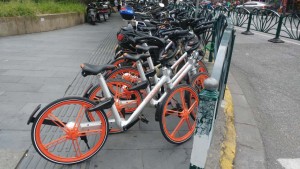INTERNET: Mobike Outage Leaves Commuters Sweaty, Late for Work
Bottom line: A peak-time outage for Mobike highlights how popular the shared bike service has become in a very short time and its vulnerability to hiccups, even though bigger issues are more likely to threaten its longer-term survival.

We’ll end the work week with a story about work itself that shows just how pervasive shared bike services have become in China’s major cities in just a year’s time. The story, involving a mass outage for leading operator Mobike, illustrates how such new technologies are prone to hiccups, and also how quickly they catch on in a place like China.
The question with all of these new technologies, especially a recent flurry related to the concept of a shared economy, is whether any will have legs and stand the test of time. The answer will probably be “yes” for a select few, such as the wave of cashlessness now taking over China that has even an old timer like me rarely spending cash for anything anymore and instead paying with my smartphone. But I suspect the vast majority of these new concepts, including shared bikes, will ultimately end up on the scrap heap of good ideas that didn’t quite work out.
That said, this latest headline comes as a minor black eye for Mobike, which has emerged as one of the two main players in the shared bike craze now gripping China alongside rival Ofo. I doubt the breakdown, which I’ll detail shortly, will have a major impact on the company. But many were undoubtedly unhappy at having to walk that last half mile to work from the bus or subway station after becoming used to making the trip quickly and cheaply by loaner bike.
Mobike is citing a system upgrade for the outage, which saw its bikes become unlockable for an unspecified period of time during the Thursday morning rush hour in at least the cities Beijing, Shanghai, Tianjin and Chengdu, and possibly many others. (Chinese article) The outage lasted until around 9:30 a.m., meaning it was fixed just in time for the morning commute to be over. The reports note that a similar outage occurred in April this year.
For anyone reading this outside of China, I should quickly describe how these services work so you can get a picture of what happened. After downloading Mobike’s app onto their smartphones, users then link the app to their bank account and can unlock any Mobike bike they see on the street or sidewalk simply by scanning a QR code printed on the back of the vehicle. The system works well because people can pick up and drop off bikes anywhere they want, unlike older shared bike services where such pickups and drop-offs can only be done at specialized racks.
Scenes of Frustration
The report I read describes scenes of frustrated commuters scanning bike after bike without any of the locks opening, and street sides where such bikes are often absent during peak hours suddenly being full during those times. As someone living in an area of Beijing heavily populated by such bikes, I can vividly imagine what it must have looked like, and the frustration many people must have felt, not to mention the sweaty state many were probably in when they finally arrived at work.
These services have quickly worked their way into the lives of many people, myself included. But that said, there’s a certain element of faddishness to many of these things as well. I recall just four or five years ago how group buying became all the rage, only to disappear almost as quickly as it rose. Bikes could have a little more staying power, as they really are quite a convenience for traveling short distances, say a half mile to one and a half miles, which is most frequent when going from a bus or subway stop to a final destination.
But the real issue with these shared bike services lies less in reliability, and more in business model. Mobike and Ofo have yet to release any financials, but I’m almost 100 percent certain they are losing massive money, even as they spend their hundreds of millions of dollars in venture cash on a breakneck expansion both at home and abroad.
One of their biggest issues is theft and damage, which the companies never discuss. That, combined with smaller issues like these breakdowns and growing impatience by city managers over the chaos they create, lead me to believe that few if any of these services will still be around a couple of years from now.
